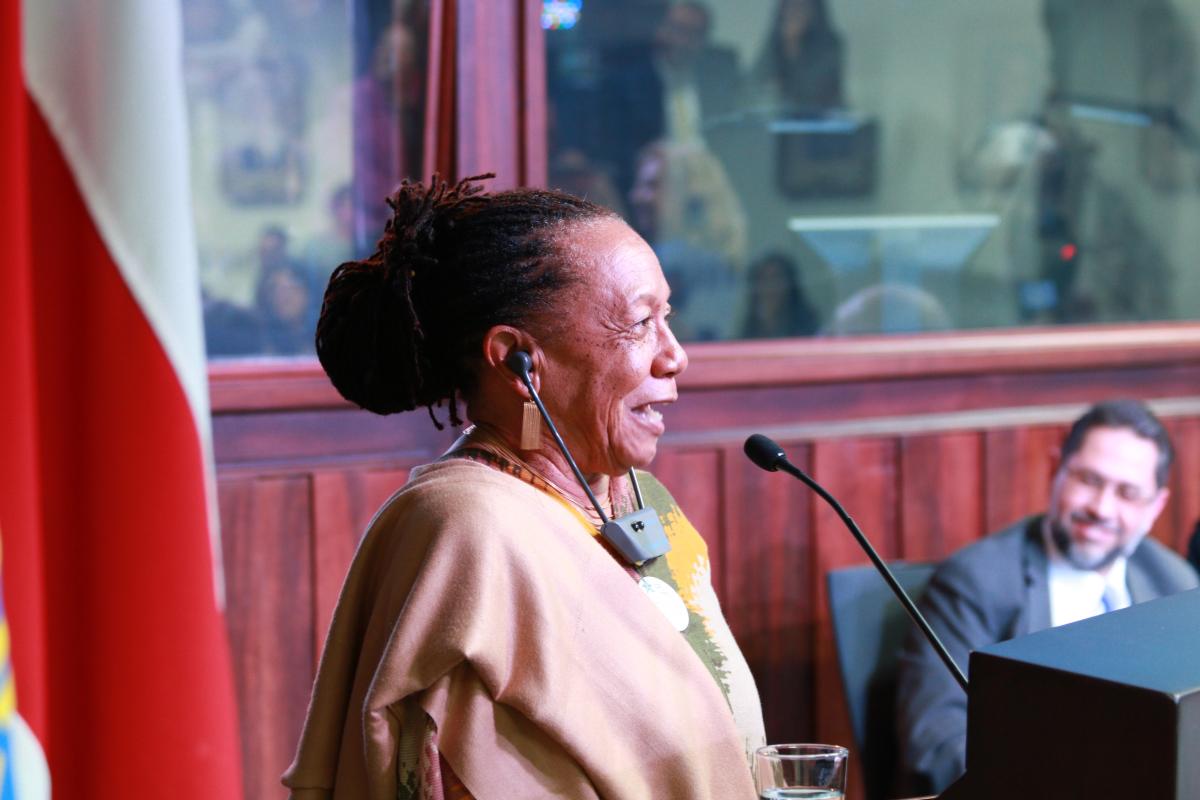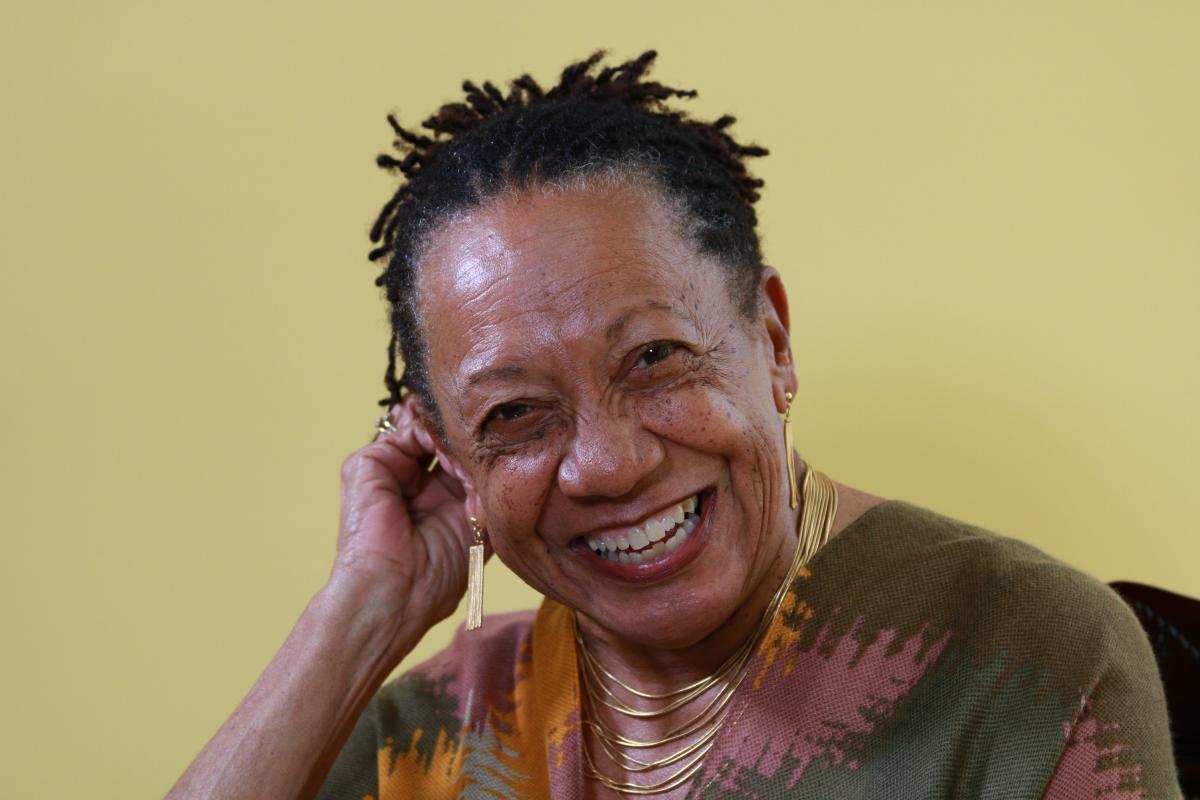“We need to be given a voice and a face so that others understand that we do matter”

San José, Costa Rica, 19 October 2018 (IICA). Even as a first-time visitor to Costa Rica, who was unfamiliar with the culture and language being spoken around her, she knew her words would echo through this meeting room and strike a chord with the agricultural authorities of Latin America and the Caribbean (LAC). She stood alone, but she was representing the 59 million women living in the region’s rural areas, who are crying out for their voices to be heard.
She is Celeste Anderson, a rural woman from Treasure Beach, Jamaica, who raised her voice to champion the personal, family and community welfare of these warriors, in this ceremony to commemorate the International Day of Rural Women. Organized by the Inter-American Institute for Cooperation on Agriculture (IICA), the event was held at its Headquarters, and was witnessed by a live and virtual audience of representatives of the agricultural sector of the Americas.
“This is a very emotional moment for me. I come from a small fishing village in Jamaica. I am both honored and afraid. I don’t know the language. At times I feel, that even though I am here, I cannot take part in the conversation. I think that this is how we, as rural women, often feel when facing the rest of the world,” said Anderson.
This woman, with her cheerful smile and brown complexion, framed by salt and pepper curls, is the co-founder and President of the Treasure Beach Women’s Group (TBWG) Benevolent Society (TBWG), a non-profit organization that seeks to promote the development of women living in this rural community in Jamaica. The group was born during a very difficult time in Celeste’s life.
She explained that, “At the time, I was taking care of my husband, and was longing for an emotional outlet. It was then that the United States Peace Corps and Jamaica’s Bureau of Women’s Affairs sent a representative to work with women in our community, and after that we continued to meet under a tree, just to talk. Now, eighteen years later, we are a strong group of women working to support the growth of the community.”
Seven years ago, this housewife lost her husband, and she confessed that caring for him during his illness drained her energy and resources completely, taking even her home.
Anderson reflected that, “You have to nurture and take care of your family, but a time will come when you ask yourself: who am I? What have I achieved? If I have earned no salary for taking care of my family, nor a pension, what do I do from here on? I think all women in the world have the same basic needs: proper and readily available services, and a top quality education for our families and for our children.”

A harsh reality for many
The community leader remarked that most children and young people in her village lack the necessary resources to study, and some of them cannot even afford school uniforms.
“When I think about education, I cannot help thinking about my situation. My children were educated, but I didn’t have the knowledge to allow me to help them with their homework. Even now, at 75 years, I would love to get my university degree, but what would I do with it? Not much at this stage of my life,” confessed the Jamaican woman, with resignation and amidst laughter.
Data from the United Nations Educational, Scientific and Cultural Organization (UNESCO), indicates that women in rural areas have a higher level of education than men, and daughters are more educated than their mothers. Yet, the generational transformation has still been insufficient to place women on an equal footing with men.
In LAC, almost 40% of women living in the countryside do not earn their own income and less than a third of them own the land on which they live.
A joint study between IICA, the Food and Agriculture Organization of the United Nations (FAO) and the Economic Commission for Latin America and the Caribbean (ECLAC), indicates that although the level of women’s participation in the work force and the rate of female headship has increased in recent years, three quarters of the homes headed by women are classified as inactive or in small-scale agriculture.
For Anderson, increased legal protection, land ownership, access to health, educational, training and financial services, as well as to technology and internet connectivity, are some of the essential basic resources that will allow women to improve their standard of living.
“Sometimes we feel so small,” she stressed. “How will I be able to walk into this room and speak in front of all of you? It is terrifying. Creating leadership programs that serve as a refuge for rural women is important. We need to be given a voice and a face, so that others understand that we do matter.”
The Treasure Beach Women’s Group Benevolent Society promotes the development of rural women and the local community through educational initiatives, projects that are income-generating and others that seek to build health awareness, to the extent that currently, it is involved in establishing a permanent health clinic, since residents of the area must travel approximately thirty minutes by car in order to access medical care.
In parting, Celeste said that, “Our small group is working to bring about change in our community, our country and the world.”
More information:
Institutional Communication Division, IICA